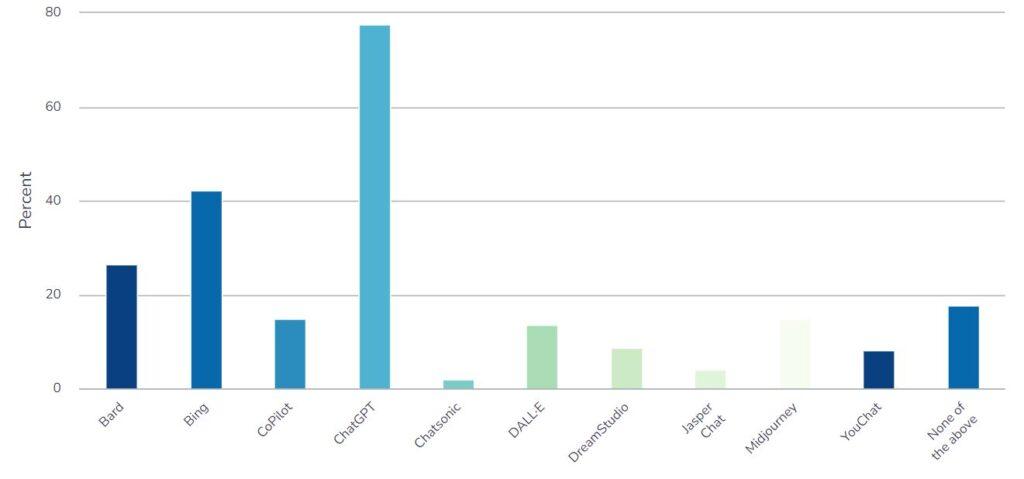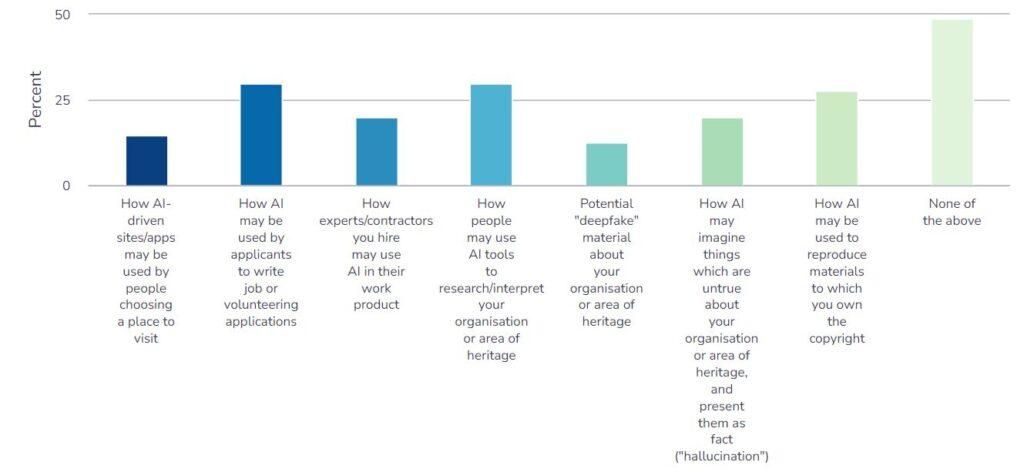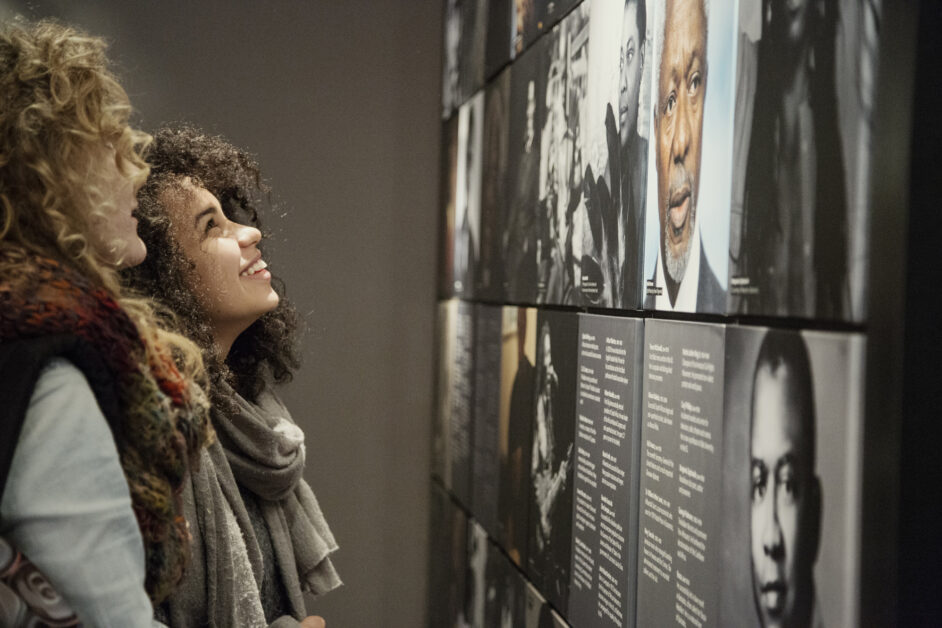Results from June 2023 Panel Research
In June 2023, 154 UK Heritage Pulse panel members responded to a short survey which focused on Artificial Intelligence and asked respondents their thoughts on its place in the heritage sector.
🔍 Click on any chart to zoom in.
The majority of respondents have some awareness of AI and AI tools – with ChatGPT the most known and used.
When asked which of a selection of terms related to AI and machine learning, 98% of respondents had heard of the term ‘Artificial Intelligence’. 70% of respondents knew the term ‘Deepfake’ while 68% had heard of ‘Machine Learning’. There were lower levels of familiarity with other terms.
When asked what Generative AI tools they had heard of, 78% of respondents said they had heard of ChatGPT. This was followed by Bing (42%) and Bard (27%).
Which of these Generative AI tools have you personally heard of?

When asked which of the tools they had heard of they had personally used, again ChatGPT was the most used. 75% of those who had heard of it had used the natural language processing tool.
Half of respondents had considered how AI may change how people interact with their organisation.
When asked how they think AI would affect how people interact with them, respondents were most likely to say that they had considered how AI might be used to write applications to work at their organisation (30%), how it could be used to research their organisation or area of heritage (30%) or how it may be used to reproduce copyrighted materials (28%).
Just under half of respondents selected ‘None of the above’, meaning that they had not considered how AI might change interactions with their organisation.
Before taking this survey, had you or your organisation already considered how AI may change the way other people interact with you?

When asked if they have taken any action as a result of discussions, respondents said they are actively exploring the opportunities and risks associated with AI, including discussions about how AI should be included in HR policies. Some are planning to incorporate AI-related interview questions into their recruitment process. Generally respondents say they are seeking tools, platforms, or partners to further explore AI’s capabilities.
“We are looking at how we address this in interview questions. Someone being able to use AI effectively may actually be beneficial to our organisation so we wouldn’t discourage it, but we’d want to know more.”
“Team commitment to explore uses and limits of ChatGPT for streamlining analysis and gauge risks to us as an organisation and in terms of our impact.”
Fewer than 1 in 4 respondents have used AI tools within their organisation.
Just 24% of respondents were aware of their organisation using AI for any purpose. Out of those who had used it or said they knew of its use, the highest proportion (41%) said it was used to help with planning for the future (such as generating ideas), closely followed by marketing including generating content, editing, programming adverts and analysing or interpreting data.
For what purpose has your organisation used AI?

Organisations made up predominantly of volunteers were the highest users of AI for future planning purposes. This was also true among smaller organisations. Whereas analysing/interpreting data was a common use among larger organisations.
Some respondents have found limited success when using ChatGPT for specific queries but recognise that it is in its early stages:
“I tried ChatGPT when I first heard about it and posed a question about medieval pottery in Doncaster. The results were not impressive. The program replied that it knew nothing about the subject and instead gave me some very basic information about pottery in general, some of which was incorrect. I intend to have another go at some stage but am not expecting very much that is useful.”
“It would be useful to know more about some of the basic techniques; how does one frame a question in order to get a precise answer? What sources of information are exploited by AI programs in order respond to questions?… Essentially, it would be useful to know the parameters within which it operates and how far these may affect the answers it gives to specific questions.”
The majority of respondents have not considered how they might use AI in the future.
65% of respondents had not considered how they might use AI in the future. Out of those who hadn’t considered using AI or how they might use it, volunteer-led organisations were the most prominent.
When asked whether they think AI presents a risk or an opportunity to their organisation, responses were very mixed. Overall, 39% felt it presents an opportunity compared to 26% who feel is presents more of a risk. 35% were either neutral or said they did not know.
Larger organisations displayed greater consideration and feelings of worry towards the use of AI and how it might affect how people interact with them. Many within this group are seeking out training to expand their knowledge in preparation.
Respondents showed a lack of confidence in finding information or training on uses of AI.
When asked how confident they are that they would be able to find information or training on the possible uses of AI, 40% stated they were not at all confident. Only 7.2% said they were very confident.
How confident are you that you would be able to find information or training on possible uses of AI?

Respondents expressed interest in a number of training areas, including basics of AI and its relevance to heritage originations, understanding its potential to adversely impact society, and getting to grips with its effect on content management:
“I don’t know what I don’t know. But I am sure AI will have a major adverse impact on society if not properly regulated – if indeed it even can be regulated effectively.”
“Practical insights into how AI processing works and where the programmes are learning and compiling from… Learning how to use prompts to get more value out of natural language processing.”
What else did respondents tell us?
Respondents recognise the importance of embracing new technologies whilst considering the possibilities and challenges brought by AI:
“Really, really interesting subject to those of us in archives – potentially a complete gamechanger for many digital archiving processes, and one in which we’re taking a close interest.”
“AI may offer opportunities to heritage organisations at a macro-level, as well as just individual organisations – this will need wider discussion and consideration.”
“I think it’s going to revolutionise the way we work, yet it is little understood by our sector. It’s so important that we are not left behind. “
Respondents acknowledged the potential of AI to revolutionise the heritage sector but highlighted that they felt there were more problems such as skills, funding, and volunteer shortages:
“Our sector needs to talk about real problems that are affecting us, like skills shortages, funding shortages and volunteer shortages. The obsession with “digital” is unhelpful, especially when digital is so poorly defined that the adjective is arbitrarily used as a meaningless noun.”
“No doubt there is a potential in using AI but it should not be at the expense of human interaction and not introduced to be seen merely as “trendy”. The heritage sector has built its reputation and viability on the actions and expertise of those working in it, AI needs to augment exiting skills and expertise and not replace it.”
Many respondents were cautious or uncomfortable about AI and may remain so. Limited resources and resistance to major technological change is proving a barrier:
“The heritage sector undoubtedly needs some knowledge leadership on this to ensure we take advantage where appropriate and do not get stung due to lack of knowledge and training.”
“As with many technologies, AI could be both a great help and a great risk, depending upon its use and who is controlling it.”
“I am very uncomfortable with AI infiltrating many aspects of life. I do not wish to implement or encourage any use of AI.”
What is your reaction to these results? Please let us know at hello@insights-alliance.com, or share on social media with the hashtag #UKHeritagePulse

